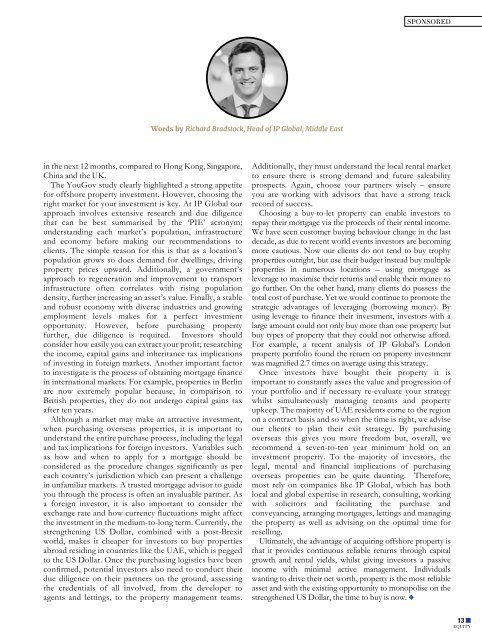Equity Magazine August 2017 Issue
You also want an ePaper? Increase the reach of your titles
YUMPU automatically turns print PDFs into web optimized ePapers that Google loves.
SPONSORED<br />
Words by Richard Bradstock, Head of IP Global, Middle East<br />
in the next 12 months, compared to Hong Kong, Singapore,<br />
China and the UK.<br />
The YouGov study clearly highlighted a strong appetite<br />
for offshore property investment. However, choosing the<br />
right market for your investment is key. At IP Global our<br />
approach involves extensive research and due diligence<br />
that can be best summarised by the ‘PIE’ acronym;<br />
understanding each market’s population, infrastructure<br />
and economy before making our recommendations to<br />
clients. The simple reason for this is that as a location’s<br />
population grows so does demand for dwellings, driving<br />
property prices upward. Additionally, a government’s<br />
approach to regeneration and improvement to transport<br />
infrastructure often correlates with rising population<br />
density, further increasing an asset’s value. Finally, a stable<br />
and robust economy with diverse industries and growing<br />
employment levels makes for a perfect investment<br />
opportunity. However, before purchasing property<br />
further, due diligence is required. Investors should<br />
consider how easily you can extract your profit; researching<br />
the income, capital gains and inheritance tax implications<br />
of investing in foreign markets. Another important factor<br />
to investigate is the process of obtaining mortgage finance<br />
in international markets. For example, properties in Berlin<br />
are now extremely popular because, in comparison to<br />
British properties, they do not undergo capital gains tax<br />
after ten years.<br />
Although a market may make an attractive investment,<br />
when purchasing overseas properties, it is important to<br />
understand the entire purchase process, including the legal<br />
and tax implications for foreign investors. Variables such<br />
as how and when to apply for a mortgage should be<br />
considered as the procedure changes significantly as per<br />
each country’s jurisdiction which can present a challenge<br />
in unfamiliar markets. A trusted mortgage advisor to guide<br />
you through the process is often an invaluable partner. As<br />
a foreign investor, it is also important to consider the<br />
exchange rate and how currency fluctuations might affect<br />
the investment in the medium-to-long term. Currently, the<br />
strengthening US Dollar, combined with a post-Brexit<br />
world, makes it cheaper for investors to buy properties<br />
abroad residing in countries like the UAE, which is pegged<br />
to the US Dollar. Once the purchasing logistics have been<br />
confirmed, potential investors also need to conduct their<br />
due diligence on their partners on the ground, assessing<br />
the credentials of all involved, from the developer to<br />
agents and lettings, to the property management teams.<br />
Additionally, they must understand the local rental market<br />
to ensure there is strong demand and future saleability<br />
prospects. Again, choose your partners wisely – ensure<br />
you are working with advisors that have a strong track<br />
record of success.<br />
Choosing a buy-to-let property can enable investors to<br />
repay their mortgage via the proceeds of their rental income.<br />
We have seen customer buying behaviour change in the last<br />
decade, as due to recent world events investors are becoming<br />
more cautious. Now our clients do not tend to buy trophy<br />
properties outright, but use their budget instead buy multiple<br />
properties in numerous locations – using mortgage as<br />
leverage to maximise their returns and enable their money to<br />
go further. On the other hand, many clients do possess the<br />
total cost of purchase. Yet we would continue to promote the<br />
strategic advantages of leveraging (borrowing money). By<br />
using leverage to finance their investment, investors with a<br />
large amount could not only buy more than one property but<br />
buy types of property that they could not otherwise afford.<br />
For example, a recent analysis of IP Global’s London<br />
property portfolio found the return on property investment<br />
was magnified 2.7 times on average using this strategy.<br />
Once investors have bought their property it is<br />
important to constantly asses the value and progression of<br />
your portfolio and if necessary re-evaluate your strategy<br />
whilst simultaneously managing tenants and property<br />
upkeep. The majority of UAE residents come to the region<br />
on a contract basis and so when the time is right, we advise<br />
our clients to plan their exit strategy. By purchasing<br />
overseas this gives you more freedom but, overall, we<br />
recommend a seven-to-ten year minimum hold on an<br />
investment property. To the majority of investors, the<br />
legal, mental and financial implications of purchasing<br />
overseas properties can be quite daunting. Therefore,<br />
most rely on companies like IP Global, which has both<br />
local and global expertise in research, consulting, working<br />
with solicitors and facilitating the purchase and<br />
conveyancing, arranging mortgages, lettings and managing<br />
the property as well as advising on the optimal time for<br />
reselling.<br />
Ultimately, the advantage of acquiring offshore property is<br />
that it provides continuous reliable returns through capital<br />
growth and rental yields, whilst giving investors a passive<br />
income with minimal active management. Individuals<br />
wanting to drive their net worth, property is the most reliable<br />
asset and with the existing opportunity to monopolise on the<br />
strengthened US Dollar, the time to buy is now.<br />
13<br />
EQUITY
















